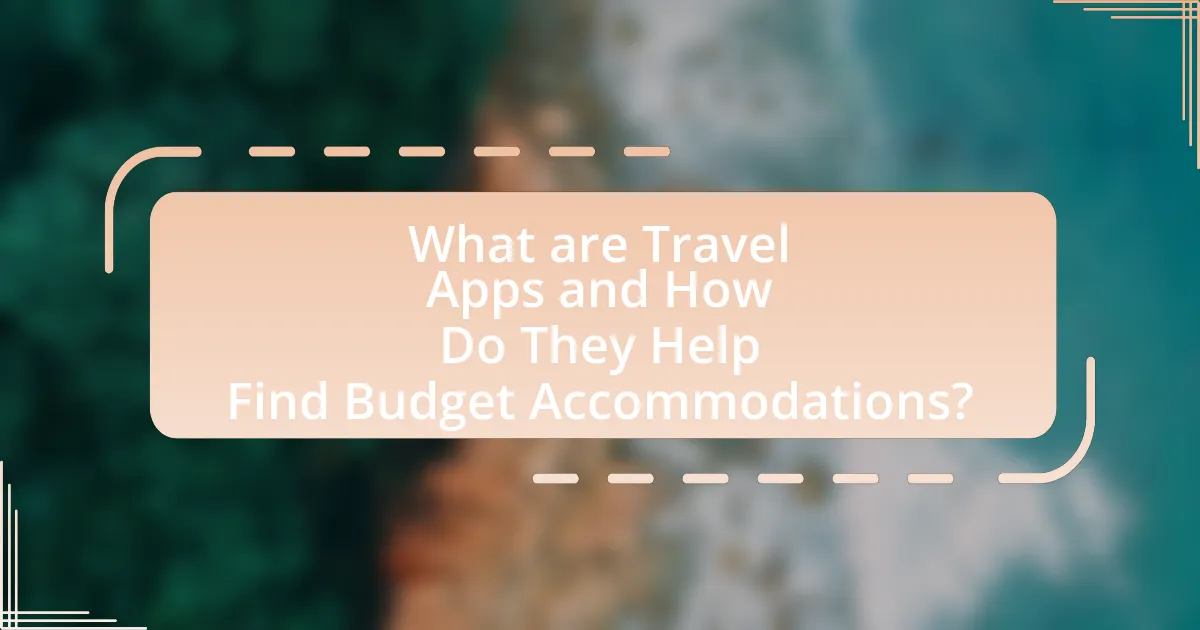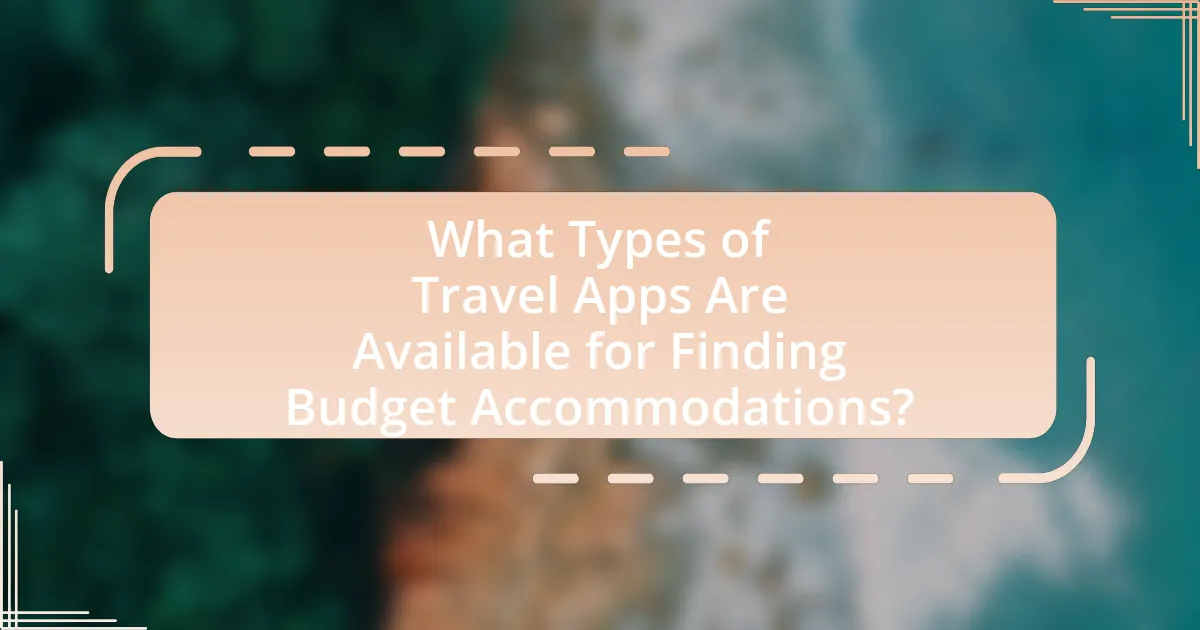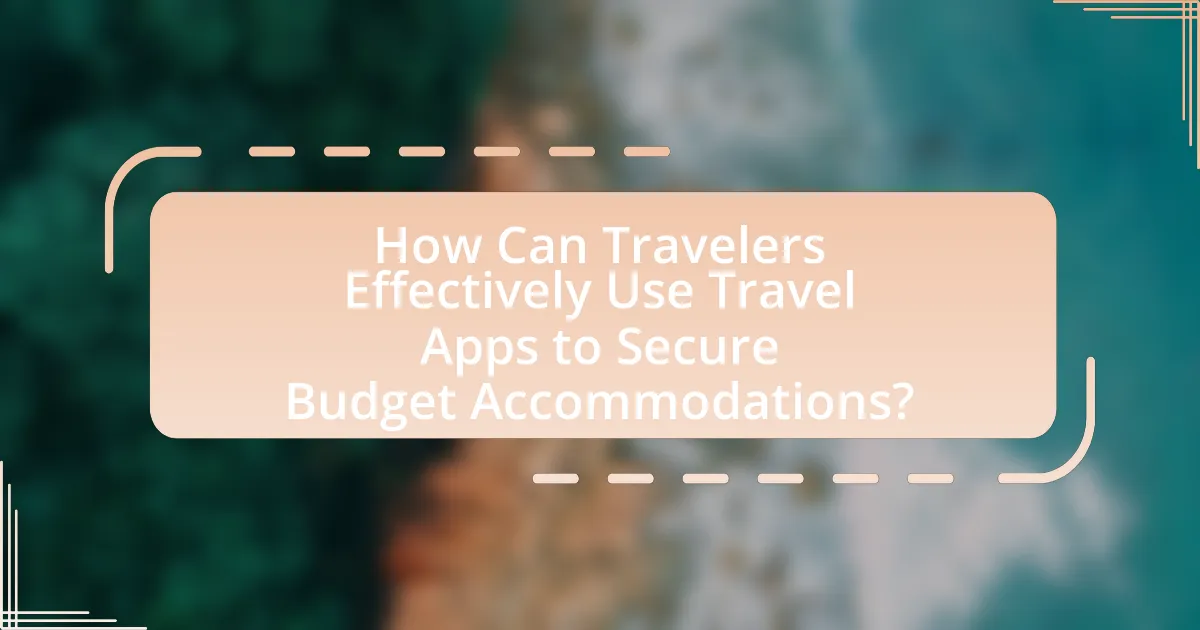Travel apps are digital tools designed to assist users in finding budget accommodations by aggregating listings from various sources, allowing for price comparisons, user reviews, and tailored searches. These apps, such as Booking.com and Airbnb, enhance the accommodation search process through features like price filters and location-based searches, making them more efficient than traditional booking methods. The article explores the different types of travel apps available, their unique features, and strategies for effectively using these platforms to secure affordable lodging. Additionally, it highlights the importance of user reviews, price comparison, and the potential pitfalls travelers should avoid when utilizing these apps.

What are Travel Apps and How Do They Help Find Budget Accommodations?
Travel apps are digital platforms designed to assist users in planning and managing their travel experiences, including finding budget accommodations. These apps aggregate listings from various sources, allowing users to compare prices, read reviews, and filter options based on their budget and preferences. For example, apps like Booking.com and Airbnb provide extensive databases of affordable lodging options, often featuring user-generated reviews and ratings that help travelers make informed decisions. Additionally, many travel apps offer exclusive deals and discounts, further enhancing the ability to secure budget-friendly accommodations.
How do travel apps function in the accommodation search process?
Travel apps function in the accommodation search process by aggregating listings from various hotels, hostels, and rental properties, allowing users to compare prices, amenities, and locations in real-time. These apps utilize algorithms to filter results based on user preferences such as budget, ratings, and proximity to attractions, enhancing the search experience. For instance, according to a study by Phocuswright, 57% of travelers use mobile apps to book accommodations, indicating their effectiveness in streamlining the booking process. Additionally, many travel apps offer user reviews and ratings, which provide insights into the quality of accommodations, further assisting users in making informed decisions.
What features do travel apps offer for budget accommodation searches?
Travel apps offer features such as price filters, user reviews, and location-based searches for budget accommodation searches. Price filters allow users to set a maximum budget, ensuring they only see options within their financial range. User reviews provide insights from previous guests, helping travelers assess the quality and value of accommodations. Location-based searches enable users to find budget options near attractions or public transport, enhancing convenience. Additionally, many apps offer comparison tools that aggregate prices from multiple booking sites, ensuring users find the best deals available.
How do travel apps compare to traditional booking methods?
Travel apps offer greater convenience and efficiency compared to traditional booking methods. Users can access a wide range of options, compare prices in real-time, and make instant bookings from their mobile devices, which is not possible with traditional methods that often require phone calls or in-person visits. According to a 2021 study by Statista, 83% of travelers prefer using mobile apps for booking due to their user-friendly interfaces and the ability to receive instant notifications about deals and changes. This shift towards digital platforms highlights the increasing reliance on technology for travel planning, making travel apps a more popular choice among modern travelers.
Why should travelers consider using apps for budget accommodations?
Travelers should consider using apps for budget accommodations because these platforms provide access to a wide range of affordable lodging options, often at lower prices than traditional booking methods. Apps like Airbnb, Booking.com, and Hostelworld aggregate listings, allowing users to compare prices, read reviews, and find deals tailored to their budget. According to a study by Phocuswright, 57% of travelers use mobile apps to book accommodations, highlighting their growing importance in the travel planning process. Additionally, many apps offer exclusive discounts and last-minute deals, further enhancing cost savings for budget-conscious travelers.
What advantages do travel apps provide for budget-conscious travelers?
Travel apps offer budget-conscious travelers the advantage of accessing real-time price comparisons, enabling them to find the most affordable accommodations. These apps aggregate data from multiple booking platforms, allowing users to quickly identify the best deals available. For instance, a study by Phocuswright found that 83% of travelers use mobile apps to compare prices, which significantly enhances their ability to save money. Additionally, many travel apps provide exclusive discounts and promotional offers that are not available through traditional booking methods, further reducing costs for users.
How can travel apps enhance the overall travel experience?
Travel apps enhance the overall travel experience by providing users with convenient access to information, booking options, and personalized recommendations. These applications streamline the process of finding budget accommodations by aggregating data from various sources, allowing travelers to compare prices, read reviews, and make informed decisions quickly. For instance, a study by Phocuswright found that 83% of travelers use mobile apps to research travel options, indicating their reliance on technology for planning. Additionally, features such as real-time notifications about price drops or special deals further optimize the travel experience, ensuring users can secure the best rates available.

What Types of Travel Apps Are Available for Finding Budget Accommodations?
Travel apps for finding budget accommodations include hotel booking apps, vacation rental platforms, and last-minute deal finders. Hotel booking apps like Booking.com and Expedia allow users to compare prices and read reviews, ensuring they find affordable options. Vacation rental platforms such as Airbnb and Vrbo offer unique lodging alternatives often at lower prices than traditional hotels. Last-minute deal finders like HotelTonight specialize in offering discounted rates for unsold hotel rooms, making them ideal for spontaneous travelers. These app categories collectively provide diverse options for budget-conscious travelers seeking cost-effective lodging solutions.
What are the main categories of travel apps for accommodation searches?
The main categories of travel apps for accommodation searches include hotel booking apps, vacation rental platforms, hostel finders, and last-minute deal apps. Hotel booking apps, such as Booking.com and Expedia, allow users to search and book hotels based on various criteria like price and location. Vacation rental platforms, like Airbnb and Vrbo, focus on private homes and unique stays. Hostel finders, such as Hostelworld, cater specifically to budget travelers seeking shared accommodations. Last-minute deal apps, like HotelTonight, provide discounted rates for same-day bookings, appealing to spontaneous travelers. Each category serves distinct needs within the accommodation search process.
How do hotel booking apps differ from vacation rental apps?
Hotel booking apps primarily focus on traditional accommodations such as hotels, motels, and inns, while vacation rental apps specialize in offering private properties like homes, apartments, and villas for short-term stays. Hotel booking apps typically provide standardized services, amenities, and pricing structures, making it easier for users to compare options within the hotel industry. In contrast, vacation rental apps often feature unique, diverse lodging experiences that can vary significantly in terms of quality and pricing, as they are managed by individual property owners. This distinction is supported by the fact that hotel booking platforms like Booking.com and Expedia cater to established hospitality businesses, whereas platforms like Airbnb and Vrbo emphasize peer-to-peer rentals, reflecting the different business models and user experiences inherent to each type of accommodation.
What role do comparison apps play in finding budget accommodations?
Comparison apps play a crucial role in finding budget accommodations by aggregating prices and options from multiple sources, allowing users to easily compare rates and amenities. These apps streamline the search process, enabling travelers to identify the most cost-effective lodging options quickly. For instance, a study by Phocuswright found that 83% of travelers use comparison tools to find the best deals, highlighting their effectiveness in budget-conscious decision-making. By providing real-time data and user reviews, comparison apps empower users to make informed choices, ultimately leading to significant savings on travel expenses.
Which popular travel apps are best for budget accommodations?
The best travel apps for budget accommodations include Airbnb, Booking.com, Hostelworld, and Agoda. Airbnb offers a wide range of affordable lodging options, including shared spaces and entire homes, often at lower prices than hotels. Booking.com provides extensive listings of budget hotels and guesthouses, frequently featuring discounts and last-minute deals. Hostelworld specializes in budget-friendly hostels, catering to backpackers and solo travelers, with user reviews to guide choices. Agoda focuses on Asia but also offers competitive rates for budget accommodations worldwide, often with exclusive deals. These apps are widely recognized for their user-friendly interfaces and extensive options, making them reliable choices for travelers seeking affordable stays.
What features make specific apps stand out for budget travelers?
Apps that stand out for budget travelers typically offer features such as price comparison tools, user reviews, and flexible search filters. Price comparison tools enable travelers to find the best deals across multiple platforms, ensuring they secure the lowest rates available. User reviews provide insights into the quality and value of accommodations, helping travelers make informed decisions based on real experiences. Flexible search filters allow users to customize their searches based on specific needs, such as location, amenities, and price range, enhancing the overall user experience. These features collectively empower budget travelers to maximize their savings while ensuring a satisfactory stay.
How do user reviews influence the choice of travel apps?
User reviews significantly influence the choice of travel apps by providing potential users with insights into the app’s functionality, reliability, and user satisfaction. Research indicates that 79% of consumers trust online reviews as much as personal recommendations, highlighting the importance of user-generated content in decision-making. Positive reviews can enhance an app’s credibility, while negative feedback can deter users, ultimately shaping their choices based on perceived value and user experiences.

How Can Travelers Effectively Use Travel Apps to Secure Budget Accommodations?
Travelers can effectively use travel apps to secure budget accommodations by utilizing features such as price comparison, filtering options, and user reviews. Price comparison tools within apps like Booking.com or Kayak allow users to find the lowest rates across multiple platforms, ensuring they get the best deal. Filtering options enable travelers to narrow down choices based on their budget, preferred amenities, and location, making it easier to find suitable accommodations. Additionally, user reviews provide insights into the quality and value of the accommodations, helping travelers make informed decisions. According to a study by Phocuswright, 83% of travelers use mobile apps to research and book travel, highlighting the importance of these tools in securing budget-friendly options.
What strategies can travelers employ when using travel apps?
Travelers can employ several strategies when using travel apps to maximize their experience and find the best budget accommodations. First, they should utilize filters to narrow down search results based on price, location, and amenities, ensuring they find options that fit their budget and preferences. Additionally, travelers can compare prices across multiple apps to identify the best deals, as prices can vary significantly between platforms.
Moreover, reading user reviews and ratings can provide insights into the quality and value of accommodations, helping travelers make informed decisions. Setting up price alerts within the apps can notify travelers of price drops or special offers, allowing them to book at the most advantageous times. Lastly, travelers should take advantage of loyalty programs or discounts offered by specific apps, which can lead to additional savings on bookings.
How can filters and sorting options optimize accommodation searches?
Filters and sorting options optimize accommodation searches by allowing users to narrow down choices based on specific criteria such as price, location, amenities, and guest ratings. This targeted approach enhances the efficiency of the search process, enabling users to quickly identify accommodations that meet their preferences and budget constraints. For instance, a study by Phocuswright found that 83% of travelers use filters to refine their search results, demonstrating the importance of these features in improving user satisfaction and decision-making. By utilizing filters and sorting options, travelers can save time and make more informed choices, ultimately leading to better accommodation experiences.
What tips can help travelers find the best deals on travel apps?
Travelers can find the best deals on travel apps by utilizing price comparison features, setting up price alerts, and booking during off-peak times. Price comparison features allow users to view multiple options and select the most affordable rates, while price alerts notify travelers when prices drop for their desired accommodations. Additionally, booking during off-peak times can lead to significant savings, as many hotels and services offer lower rates to attract customers during less busy periods. According to a study by the American Hotel and Lodging Educational Institute, booking mid-week can save travelers up to 30% compared to weekend rates.
What common pitfalls should travelers avoid when using travel apps?
Travelers should avoid relying solely on travel apps for information without cross-referencing other sources. Many travel apps may not provide the most up-to-date or comprehensive data, leading to potential misinformation about accommodations, prices, or availability. For instance, a study by the American Hotel and Lodging Educational Institute found that 30% of travelers experienced discrepancies between app listings and actual conditions upon arrival. Additionally, travelers should be cautious of hidden fees that may not be clearly displayed in the app, as these can significantly increase the total cost of accommodations.
How can travelers ensure they are getting the best price?
Travelers can ensure they are getting the best price by comparing rates across multiple travel apps and websites. Utilizing platforms like Kayak, Skyscanner, and Google Flights allows users to view a range of prices for accommodations and flights, ensuring they can identify the lowest available rates. Additionally, setting up price alerts on these apps can notify travelers when prices drop, providing timely opportunities to book at the best price. Research indicates that travelers who compare prices across at least three different platforms can save an average of 20% on their bookings.
What should travelers be cautious about regarding app reviews and ratings?
Travelers should be cautious about the authenticity and reliability of app reviews and ratings. Many reviews can be manipulated or fabricated, leading to a skewed perception of an app’s quality. Research indicates that around 30% of online reviews may be fake, which can mislead users into choosing subpar accommodations. Additionally, travelers should consider the context of reviews, as individual experiences can vary widely based on personal preferences and expectations.
What are the best practices for using travel apps to find budget accommodations?
To find budget accommodations using travel apps, users should compare prices across multiple platforms to ensure they are getting the best deal. Research indicates that prices can vary significantly between apps, with some offering exclusive discounts or promotions. Additionally, users should utilize filters to narrow down options based on price range, amenities, and location, which enhances the efficiency of the search process. Reading user reviews and ratings can provide insights into the quality of accommodations, helping users make informed decisions. Lastly, booking in advance often leads to better rates, as last-minute bookings tend to be more expensive.
How can travelers combine multiple apps for better results?
Travelers can combine multiple apps by using a hotel booking app alongside a price comparison app to identify the best budget accommodations. For instance, a traveler can use a hotel booking app like Booking.com to find available hotels and then cross-reference prices with a price comparison app such as Trivago to ensure they are getting the lowest rate. This method leverages the strengths of each app, allowing travelers to access a wider range of options and potentially uncover exclusive deals or discounts that may not be visible on a single platform.
What are the key factors to consider when selecting accommodations through apps?
When selecting accommodations through apps, key factors include location, price, amenities, user reviews, and cancellation policies. Location is crucial as it affects accessibility to attractions and transportation; for instance, accommodations in city centers often provide better access to public transport. Price is a determining factor, as budget travelers need to find options that fit their financial constraints while still offering value. Amenities such as Wi-Fi, breakfast, and parking can significantly enhance the stay, making them important considerations. User reviews provide insights into the experiences of previous guests, helping to gauge the quality and reliability of the accommodation. Lastly, understanding cancellation policies is essential to avoid unexpected charges or complications, especially in uncertain travel conditions.